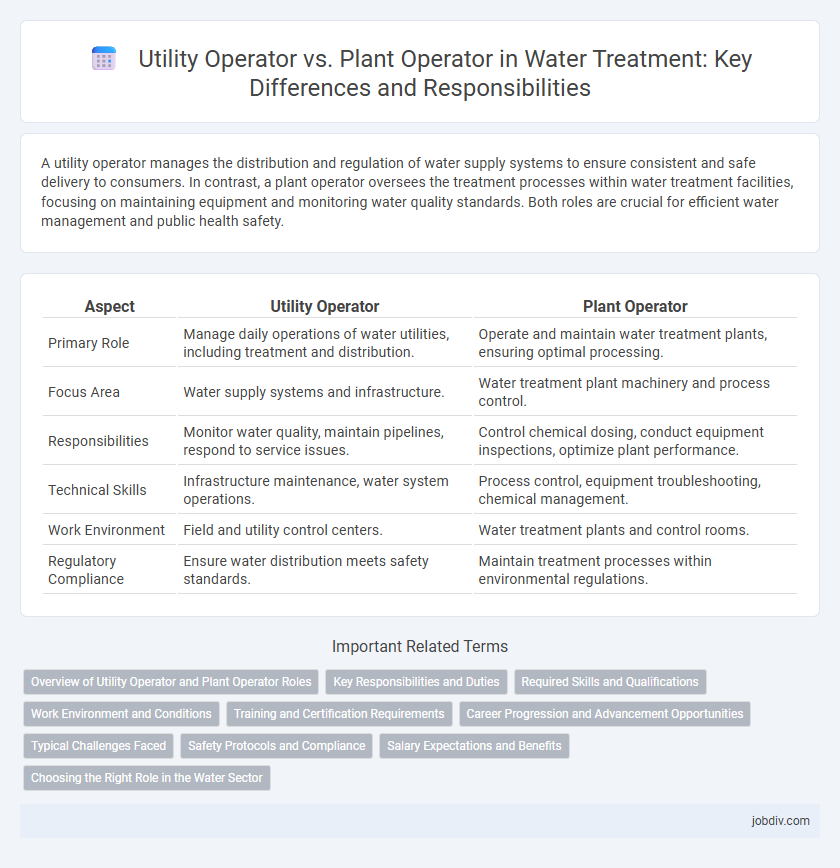A utility operator manages the distribution and regulation of water supply systems to ensure consistent and safe delivery to consumers. In contrast, a plant operator oversees the treatment processes within water treatment facilities, focusing on maintaining equipment and monitoring water quality standards. Both roles are crucial for efficient water management and public health safety.
Table of Comparison
| Aspect | Utility Operator | Plant Operator |
|---|---|---|
| Primary Role | Manage daily operations of water utilities, including treatment and distribution. | Operate and maintain water treatment plants, ensuring optimal processing. |
| Focus Area | Water supply systems and infrastructure. | Water treatment plant machinery and process control. |
| Responsibilities | Monitor water quality, maintain pipelines, respond to service issues. | Control chemical dosing, conduct equipment inspections, optimize plant performance. |
| Technical Skills | Infrastructure maintenance, water system operations. | Process control, equipment troubleshooting, chemical management. |
| Work Environment | Field and utility control centers. | Water treatment plants and control rooms. |
| Regulatory Compliance | Ensure water distribution meets safety standards. | Maintain treatment processes within environmental regulations. |
Overview of Utility Operator and Plant Operator Roles
Utility Operators manage water distribution systems, ensuring efficient delivery and maintenance of pipelines, valves, and pumps to provide clean water to consumers. Plant Operators control water treatment facilities, monitoring chemical processes, filtration, and disinfection to maintain water quality standards. Both roles are critical for sustainable water management and public health safety.
Key Responsibilities and Duties
Utility operators manage the distribution and maintenance of water supply systems, ensuring operational efficiency and regulatory compliance for municipal or commercial utilities. Plant operators oversee water treatment facilities, monitoring chemical dosing, filtration processes, and equipment performance to guarantee water quality standards are met. Both roles require expertise in system diagnostics, emergency response, and routine maintenance but differ in scope, with utility operators focusing on network infrastructure and plant operators concentrating on treatment plant operations.
Required Skills and Qualifications
Utility operators require comprehensive knowledge of water treatment processes, mechanical systems, and regulatory compliance to maintain infrastructure efficiently. Plant operators must possess advanced technical skills in monitoring water quality, operating complex machinery, and troubleshooting to ensure safe and continuous plant operations. Both roles demand certifications such as a Water Treatment Operator License, alongside strong problem-solving capabilities and communication skills.
Work Environment and Conditions
Utility operators in water management typically work outdoors, maintaining pipelines, pumps, and treatment facilities under variable weather conditions often involving physically demanding tasks. Plant operators usually perform their duties indoors within water treatment plants, monitoring machinery and water quality controls in a controlled environment with exposure to chemicals and automated systems. Both roles require adherence to safety protocols, but utility operators face more physically intensive and exposure-related challenges compared to the technical and environmental monitoring focus of plant operators.
Training and Certification Requirements
Utility operators in the water sector typically require certification in water distribution and treatment processes, emphasizing skills in system maintenance and regulatory compliance. Plant operators must complete specialized training programs, often including certified operator courses that cover advanced water treatment technologies, safety protocols, and environmental regulations. Both roles demand ongoing education to meet state and federal standards, with certification renewal processes ensuring adherence to evolving water quality and safety guidelines.
Career Progression and Advancement Opportunities
Utility operators primarily manage water distribution systems, ensuring consistent service and maintenance, while plant operators focus on treating and processing water at treatment facilities. Career progression for utility operators often leads to supervisory roles overseeing distribution networks or transitioning into specialized technical positions such as water quality analysis. Plant operators advance by acquiring certifications in water treatment, progressing to senior plant manager roles or positions in environmental compliance and regulatory affairs.
Typical Challenges Faced
Utility operators often face challenges related to managing fluctuating water demand, maintaining infrastructure integrity, and ensuring regulatory compliance under varying environmental conditions. Plant operators deal with complex processes such as chemical dosing, waste management, and real-time monitoring of water quality parameters to meet strict safety standards. Both roles require rapid problem-solving skills to minimize downtime and optimize system efficiency in water treatment and distribution.
Safety Protocols and Compliance
Utility operators in water management primarily focus on maintaining distribution systems and ensuring regulatory compliance with local water quality standards, emphasizing routine safety protocols for pipeline integrity and contamination prevention. Plant operators manage water treatment facilities, closely monitoring chemical dosing and equipment operation to meet stringent safety regulations mandated by the EPA and OSHA, reducing risks associated with hazardous substances. Both roles require comprehensive training in emergency response procedures and adherence to standard operating procedures to safeguard public health and environmental safety.
Salary Expectations and Benefits
Utility Operators in the water sector typically earn an average salary ranging from $45,000 to $65,000 annually, reflecting responsibilities such as monitoring water distribution systems and ensuring regulatory compliance. Plant Operators, handling more complex tasks like managing water treatment processes, often command higher salaries between $55,000 and $75,000 per year due to specialized skills and certifications required. Benefits for both positions commonly include health insurance, retirement plans, and opportunities for overtime pay, with Plant Operators occasionally receiving additional training allowances or shift differentials.
Choosing the Right Role in the Water Sector
Utility operators manage the distribution and maintenance of water supply systems, ensuring safe and reliable service to communities, while plant operators oversee treatment processes that purify water and wastewater. Choosing the right role depends on interests in fieldwork and system management versus operational control and technical expertise in treatment technologies. Understanding these distinctions helps professionals align their skills with career growth opportunities in water infrastructure and sustainability.
Utility Operator vs Plant Operator Infographic

 jobdiv.com
jobdiv.com